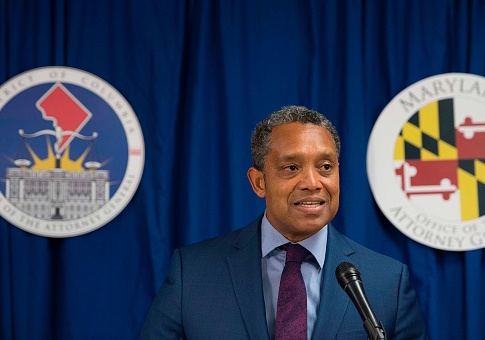The attorney general of Washington, D.C., announced on Thursday that the city would not appeal to the Supreme Court a federal appeals court decision striking down a provision in its strict gun-carry law.
"Public safety is, and has always been, my paramount concern," Attorney General Karl Racine said in a statement. "I continue to believe the District's 'good reason' requirement is a common-sense, and constitutional, gun regulation. However, we must reckon with the fact that an adverse decision by the Supreme Court could have wide-ranging negative effects not just on District residents, but on the country as a whole."
Racine said he made the decision after consulting with elected officials in the city.
"In consultation with Mayor Bowser, Chairman Mendelson, Judiciary Committee Chairman Charles Allen and multiple stakeholders, and after careful consideration, we reached consensus that abiding by the D.C. Circuit's ruling was the wisest course of action to protect public safety in the District and nationwide," he said. "Therefore, I have decided not to appeal to the Supreme Court."
A provision in the city's gun-carry law that allowed government officials to deny permits to anyone they did not believe had a "good reason" to have one was declared unconstitutional by the United States Court of Appeals for the District of Columbia Circuit in July. The court argued that the city's law, which has produced only 126 permits through July 2017, is designed with the intention of denying most normal citizens the ability to carry a gun.
"We are bound to leave the District as much space to regulate as the Constitution allows—but no more. Just so, our opinion does little more than trace the boundaries laid in 1791 and flagged in Heller I," Judge Thomas Griffith wrote for the 2-1 majority in the case. "And the resulting decision rests on a rule so narrow that good-reason laws seem almost uniquely designed to defy it: that the law-abiding citizen's right to bear common arms must enable the typical citizen to carry a gun."
The same court then denied the city's request to have a further hearing on their law in September, effectively finalizing the case at the appeals court level. The city had a week to decide whether or not to appeal the decision to the Supreme Court. On Thursday, they decided not to.
The D.C. attorney general's office said one reason they decided not to appeal the decision was concern that while a loss at the appeals court level only affects laws in Washington, a loss at the Supreme Court would affect the laws in the handful of other states that employ similar "good reason" clauses. "A loss in the Supreme Court could affect similar gun regulations in other jurisdictions—including in nearby states like Maryland, New Jersey, and New York," the office said in a release. "The proliferation of guns in those places can have spillover effects for the safety of District residents."
For the same reason, gun-rights activists have greeted the decision with mixed emotions.
"We believe the city was under intense pressure to take the hit and not appeal the ruling by the U.S. District Court of Appeals," Alan Gottlieb, founder of the Second Amendment Foundation, a plaintiff in the case against the city, told the Washington Free Beacon. "If the District had lost the case before the High Court, it would have dealt a fatal blow to similar requirements in California, New Jersey, Maryland, and New York, for example, and that prospect had anti-gun politicians in those states quaking in their shoes."
Gottlieb said the decision means circuit-level federal courts are now split on the question of "good reason" clauses, and that is likely to draw attention from the Supreme Court, eventually.
"However, this decision opens the gate farther to an inevitable High Court confrontation because there are now conflicting opinions on concealed carry from the different circuit courts," he said. "Common sense says that the 14th Amendment's equal protection clause will not allow that conflict to continue."
The Metropolitan Police Department, which is tasked with issuing gun-carry permits in D.C., said it would stop enforcing the "good reason" clause once the federal court issued its official mandate requiring it to do so.
"Since we aren't asking the Supreme Court to review the D.C. circuit decision, the removal of the District's 'good reason' requirement will take effect when the D.C. circuit court issues what's called a 'mandate' that effectuates its decision," Rachel Schaerr Reid, a department spokesperson, told the Free Beacon. "That's expected to happen in the next few days."
Both the attorney general's office and the Metropolitan Police Department said the city's other permit-application regulations, like requirements for completing a background check and firearms training, are unaffected by the ruling and will continue to be enforced.
